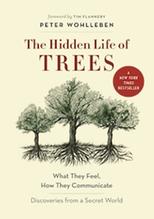In The Hidden Life of Trees: What they Feel, How they Communicate (Greystone Books), Peter Wohlleben illuminates how trees form underground networks that allow them to grow together and nurture each other. As a forest ranger who has immersed himself in scientific literature, Wohlleben argues that people need to take on a role of stewardship of trees in order to preserve and create healthy forests. We asked him where his sense of wonder about trees and forests comes from: "It comes from the guided tours I have been doing for 25 years. I never wanted to write a book, but I wanted to tell people about my forest."
We asked him where his sense of wonder about trees and forests comes from: "It comes from the guided tours I have been doing for 25 years. I never wanted to write a book, but I wanted to tell people about my forest."
He avers that trees talk to each other, take care of each other, and form a community. They create a society of trees. "They also pass on memories to the next generation... trees are so slow, so we can't see how they behave or what they are doing because to us they don't move. But they move. For example, there's new research that shows trees sleep at night and let down their branches. At first sunlight they stand up again. And when trees are next to streetlights that are on all night, they can't sleep and they die prematurely."
He believes that trees should have rights. How does he see that happening, given that many people view trees as a commodity? "In Switzerland, the rights of plants is in their constitution. I'm not saying that we shouldn't use timber. It's just that any time we have a choice to treat trees a little bit better, we should do it. We divide animals and plants into first- and second-class beings, but trees are not second-class beings."
His next book will be about the inner life of animals. "There are many amazing things. For example, research shows that flies can dream. My relationship with animals is even longer than that with trees. When I was a teen, I had a chicken I raised from an egg that followed me around like I was its mother. Really, the animal book should have come first." --Justus Joseph

